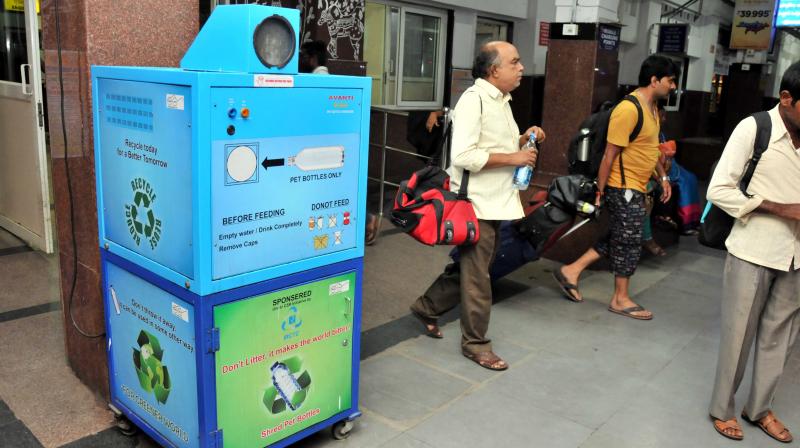Plastic crushers installed at Secunderabad, Rajahmundry, Vijayawada, Nellore.
Plastic crusher unit has been setup at Kacheguda railway station.
Hyderabad: Indian Railway Catering and Tourism Corporation (IRCTC) has installed plastic crusher units in various railway stations in the South Central Railway Zone as part of their Corporate Social Responsibility (CSR) activities. In Hyderabad city, Kacheguda Railway station was the first one to get a plastic crusher machine. A similar machine will be soon installed in nine more stations in the zone.
These machines were installed at stations in Secunderabad, Rajahmundry, Vijayawada and Nellore districts. Plastic waste in the form of disposable water bottles get crushed into smaller pieces by a Water Bottle Crushing Machine to generate recycled plastic waste every day.
According to the Railway authorities, they had been encouraging the passengers to crush the plastic bottles if they are not going to use it anymore. However, in few Railway stations such as Vadodara and three railway stations in Bengaluru, Railways had been paying Rs 5 via Paytm to crush the plastic bottles. Under the scheme, passengers will get a cashback of `5 in their Paytm wallet for dropping a plastic bottle into the crushing machine.
Divisional Railway Manager, Hyderabad Division, has initiated the project in which the disposable water bottles get crushed in to smaller pieces. Passengers and Railway workers are making use of this machine to produce 2-3 kg of plastic waste every day. This plastic is being sold to rag pickers as recycled plastic waste.
Chief Spokesperson of South Central Railway (SCR) told DC: “Plastic waste has been posing a major threat to the ecosystem as most of the plastic waste does not get recycled and the same has been affecting the environment. Mostly, these water bottles are reused for drinking purpose which is not a safe practice. Railways have taken steps to combat this problem by installing Bottle Crusher Machines at platforms. This is the IRCTC’s CSR activity and the machines are maintained by the Railways’’.
B.V. Subba Rao, Environment, Water and Climate Change expert said: “I congratulate the Railways for such a wonderful initiative because such strategy will help in reducing the plastic problem as in Taiwan, where school bags and sports shoes are made from recycled pet bottles. Soft plastic carry bags can be used for road carpeting along with Bitumen. Paying people to dispose the waste can motivate them to save the environment from plastic menace.’’
“Railways should involve rag pickers and make them the official plastic waste collectors. However, the waste collectors needs to be trained to streamline the entire collection process. The government came up with ‘Karmachari training’ which is not happening any where,” he said.
Madhulika Choudhary, an environmentalist said, “If garbage becomes a source of earning, we will definitely maintain it properly and will not throw it out carelessly. This will be a win-win situation for everybody. But this should be implemented properly. I think it may have implementation flaws. For example, if one garbage picker will start putting bottles in the machine by not giving an opportunity to others, it can lead to large scale dissatisfaction and fights. Along with this, sustainability may be another factor. This may lead to buying of more plastic bottles. Somehow, ultimately we must attack the plastic generation source.”
“Plastic waste is more in urban cities. It must come under the social responsibility of people to dispose it properly. I don’t prefer to pay a plastic user for better waste disposal. It would be good if raddiwalas make money because when plastic producers are rich companies, then plastic disposers must be rich too,” she said.
“Usually dry plastic bags and bottles are kept for resale and all wet polybags or bottles are thrown on road. But in greed of earning more money, people will dry wet poly bags and put them in the machine,” she said.
Article Source: Deccan chronicle

